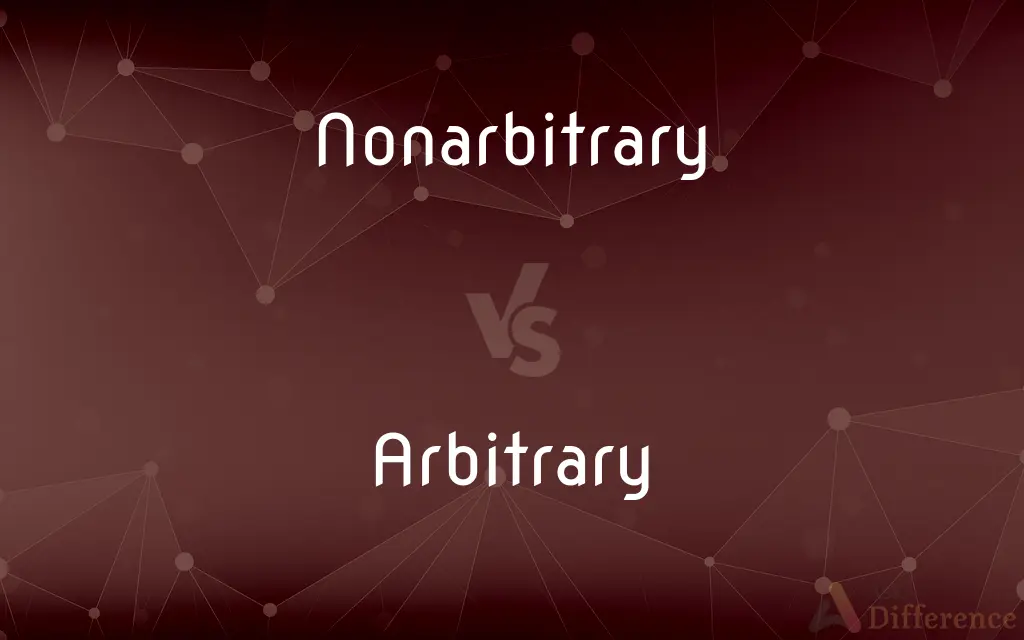Nonarbitrary vs. Arbitrary — What's the Difference?
By Fiza Rafique & Maham Liaqat — Updated on March 19, 2024
Nonarbitrary decisions are based on clear rules or standards, while arbitrary ones rely on personal discretion or whim.

Difference Between Nonarbitrary and Arbitrary
Table of Contents
ADVERTISEMENT
Key Differences
Nonarbitrary actions or decisions are guided by established rules, principles, or systems, ensuring consistency and fairness. They are often predictable and can be justified through logical or systematic reasoning. On the other hand, arbitrary actions or decisions are made based on individual discretion without the need for a structured framework, which can lead to unpredictability and perceived unfairness.
In legal contexts, nonarbitrary judgments are crucial for maintaining the integrity of the justice system, as they rely on precedent and codified law to ensure equitable treatment. Conversely, arbitrary decisions in this context might reflect personal biases or unfounded preferences, potentially undermining trust in legal proceedings.
In organizational settings, nonarbitrary policies and practices help in creating a transparent and trustworthy environment. Employees understand the rationale behind decisions, which fosters a sense of fairness and respect. Arbitrary decisions in these settings, however, can lead to confusion, dissatisfaction, and perceptions of injustice among stakeholders.
When it comes to personal relationships, nonarbitrary behavior is often appreciated because it reflects thoughtfulness and consideration, adhering to social norms or mutual agreements. Arbitrary behavior, while sometimes seen as a sign of individuality or spontaneity, can lead to unpredictability and strain relationships if it disregards the feelings or expectations of others.
Comparison Chart
Basis
Guided by rules, standards, or logic
Based on personal discretion or whim
ADVERTISEMENT
Predictability
Generally predictable and consistent
Often unpredictable and inconsistent
Fairness
Perceived as fair and equitable
Can be perceived as unfair or biased
Contexts
Important in legal, organizational, and personal settings
Can be found in personal decisions, creative endeavors, etc.
Impact
Fosters trust, transparency, and equity
Can lead to confusion, dissatisfaction, and perceived injustice
Compare with Definitions
Nonarbitrary
Based on a clear set of rules or standards.
The judge's decision was nonarbitrary, adhering strictly to the law.
Arbitrary
Based on random choice or personal whim.
The assignment of tasks seemed arbitrary, with no clear rationale.
Nonarbitrary
Not subject to individual will or judgment.
The application process is designed to be nonarbitrary and impartial.
Arbitrary
Subject to individual will or judgment without restriction.
The king ruled in an arbitrary manner, without regard for the laws.
Nonarbitrary
Characterized by consistency and fairness.
The company's policies are nonarbitrary, applying equally to all employees.
Arbitrary
Capricious or unreasonable.
The sudden changes in policy appeared arbitrary and confused the staff.
Nonarbitrary
Decided or done for reasons that are known and can be explained.
The selection was nonarbitrary, based on predefined criteria.
Arbitrary
Not fixed by rules but left to one's discretion.
The use of colors in the artwork was arbitrary, guided by the artist's mood.
Nonarbitrary
Not random or done by chance.
The arrangement of books in the library is nonarbitrary, following a specific classification system.
Arbitrary
Determined by chance, whim, or impulse.
The decision to travel was made in an arbitrary fashion, without much planning.
Nonarbitrary
Not arbitrary.
Arbitrary
Based on random choice or personal whim, rather than any reason or system
An arbitrary decision
Nonarbitrary
Not subject to individual determination
Arbitrary
(of power or a ruling body) unrestrained and autocratic in the use of authority
A country under arbitrary government
Arbitrary
(of a constant or other quantity) of unspecified value.
Arbitrary
Determined by chance, whim, or impulse, and not by necessity, reason, or principle
Stopped at the first motel we passed, an arbitrary choice.
Arbitrary
Based on or subject to individual judgment or preference
The diet imposes overall calorie limits, but daily menus are arbitrary.
Arbitrary
(Law) Relating to a decision made by a court or legislature that lacks a grounding in law or fact
An arbitrary penalty.
Arbitrary
Not limited by law; despotic
The arbitrary rule of a dictator.
Arbitrary
Determined by impulse rather than reason; heavy-handed.
Arbitrary
(mathematics) Any, out of all that are possible.
The equation is true for an arbitrary value of x.
Arbitrary
Determined by independent arbiter.
Arbitrary
(linguistics) Not representative or symbolic; not iconic.
Arbitrary
Anything arbitrary, such as an arithmetical value or a fee.
Arbitrary
Depending on will or discretion; not governed by any fixed rules; as, an arbitrary decision; an arbitrary punishment.
It was wholly arbitrary in them to do so.
Rank pretends to fix the value of every one, and is the most arbitrary of all things.
Arbitrary
Exercised according to one's own will or caprice, and therefore conveying a notion of a tendency to abuse the possession of power.
Arbitrary power is most easily established on the ruins of liberty abused licentiousness.
Arbitrary
Despotic; absolute in power; bound by no law; harsh and unforbearing; tyrannical; as, an arbitrary prince or government.
Arbitrary
Based on or subject to individual discretion or preference or sometimes impulse or caprice;
An arbitrary decision
The arbitrary rule of a dictator
An arbitrary penalty
Of arbitrary size and shape
An arbitrary choice
Arbitrary division of the group into halves
Common Curiosities
What does nonarbitrary mean?
Nonarbitrary refers to actions or decisions based on clear, consistent rules or standards, ensuring fairness and predictability.
Can a decision be partially nonarbitrary and partially arbitrary?
Yes, some decisions may combine elements of both, using established guidelines but also allowing for some discretion.
Why is it important for legal decisions to be nonarbitrary?
Nonarbitrary legal decisions maintain the integrity of the justice system by ensuring decisions are based on law and precedent, promoting fairness and equity.
What is an arbitrary decision?
An arbitrary decision is made based on personal discretion or whim, without following a systematic rationale.
Are all personal decisions arbitrary?
Not all personal decisions are arbitrary; many are guided by personal values, ethical considerations, or social norms.
How do arbitrary decisions affect organizational culture?
Arbitrary decisions can undermine trust and fairness in an organization, leading to confusion and dissatisfaction among employees.
Can arbitrary decisions ever be justified?
In some contexts, like creative work or personal preferences, arbitrary decisions can be justified as they reflect individuality and spontaneity.
What role does consistency play in nonarbitrary actions?
Consistency is key in nonarbitrary actions, as it ensures that decisions are made based on a stable set of principles or criteria.
Is there a place for arbitrary decisions in creative fields?
Yes, in creative endeavors, arbitrary choices can foster innovation and originality by breaking free from conventional rules.
How can organizations avoid arbitrary practices?
Organizations can avoid arbitrary practices by developing clear policies, ensuring consistent application, and fostering a culture of transparency.
Why might someone prefer arbitrary decisions?
Some may prefer arbitrary decisions for the flexibility and freedom they offer, allowing for spontaneity and personal expression.
How can one ensure decisions are nonarbitrary?
Decisions can be made less arbitrary by establishing and following clear guidelines, ensuring transparency and accountability in the decision-making process.
What makes a policy nonarbitrary?
A nonarbitrary policy is grounded in clear, objective criteria and applied consistently, ensuring fairness and transparency.
How can arbitrary decisions be challenged?
Arbitrary decisions can be challenged by requesting transparency, justification, and adherence to established rules or standards.
What is the impact of arbitrary behavior in relationships?
Arbitrary behavior can lead to unpredictability and strain in relationships, especially if it disregards the expectations or feelings of others.
Share Your Discovery

Previous Comparison
Null vs. Empty
Next Comparison
Conductance vs. InductanceAuthor Spotlight
Written by
Fiza RafiqueFiza Rafique is a skilled content writer at AskDifference.com, where she meticulously refines and enhances written pieces. Drawing from her vast editorial expertise, Fiza ensures clarity, accuracy, and precision in every article. Passionate about language, she continually seeks to elevate the quality of content for readers worldwide.
Co-written by
Maham Liaqat















































